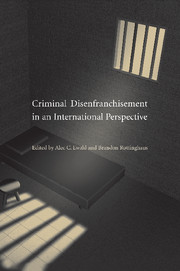Book contents
- Frontmatter
- Contents
- Contributors
- Foreword: Waves of Democracy and Criminal Disenfranchisement
- Acknowledgments
- Introduction
- Part I CONTEMPORARY DISENFRANCHISEMENT LAW
- Part II DISENFRANCHISEMENT IN COMPARATIVE PERSPECTIVE: LEGAL AND POLITICAL APPROACHES
- 3 U.S. Felon Disenfranchisement: Parting Ways with Western Europe
- 4 The Right to Universal, Equal, and Nondiscriminatory Suffrage as a Norm of Customary International Law: Protecting the Prisoner's Right to Vote
- 5 Our ‘Crooked Timber’: Why Is American Punishment So Harsh?
- Part III VOTING RIGHTS AND PEOPLE WITH CRIMINAL CONVICTIONS: CASE STUDIES
- Index
- References
4 - The Right to Universal, Equal, and Nondiscriminatory Suffrage as a Norm of Customary International Law: Protecting the Prisoner's Right to Vote
Published online by Cambridge University Press: 03 July 2009
- Frontmatter
- Contents
- Contributors
- Foreword: Waves of Democracy and Criminal Disenfranchisement
- Acknowledgments
- Introduction
- Part I CONTEMPORARY DISENFRANCHISEMENT LAW
- Part II DISENFRANCHISEMENT IN COMPARATIVE PERSPECTIVE: LEGAL AND POLITICAL APPROACHES
- 3 U.S. Felon Disenfranchisement: Parting Ways with Western Europe
- 4 The Right to Universal, Equal, and Nondiscriminatory Suffrage as a Norm of Customary International Law: Protecting the Prisoner's Right to Vote
- 5 Our ‘Crooked Timber’: Why Is American Punishment So Harsh?
- Part III VOTING RIGHTS AND PEOPLE WITH CRIMINAL CONVICTIONS: CASE STUDIES
- Index
- References
Summary
In the mid-17th century, Oliver Cromwell led Parliamentarian forces in a successful military campaign against the Royalists in the English Civil War. Cromwell captured and executed King Charles I in 1649. One faction of his Puritan coalition was known as the Levellers, a title initially applied by their detractors but one they themselves later embraced. The Levellers believed in the natural equality of all men in the political order (it appearing to have been beyond anyone's imagination at the time that women might have any political rights). “Universal manhood suffrage” was a key element of Leveller philosophy, which opposed limitation of the franchise to the propertied classes. As one of their leaders, a certain Colonel Rainsborough, famously put it in 1647, “Every man that is to live under a government ought first by his own consent to put himself under that government.”
The Levellers' concept was too radical. After Cromwell took power, he found the Leveller philosophy on suffrage more threatening to political stability than any of their other principles – including universal free speech – some of which would apparently influence the youthful U.S. government in the drafting of the Bill of Rights. Cromwell believed that their concept of universal manhood suffrage “pointed toward anarchy, [was an] attack on property, and [encouraged] mutiny in the army,” the latter because only soldiers believed they should have the right to vote. Cromwell's forces took up arms against the Levellers, they were repressed, and their leaders captured and shot (Cook 2006).
- Type
- Chapter
- Information
- Criminal Disenfranchisement in an International Perspective , pp. 109 - 135Publisher: Cambridge University PressPrint publication year: 2009



